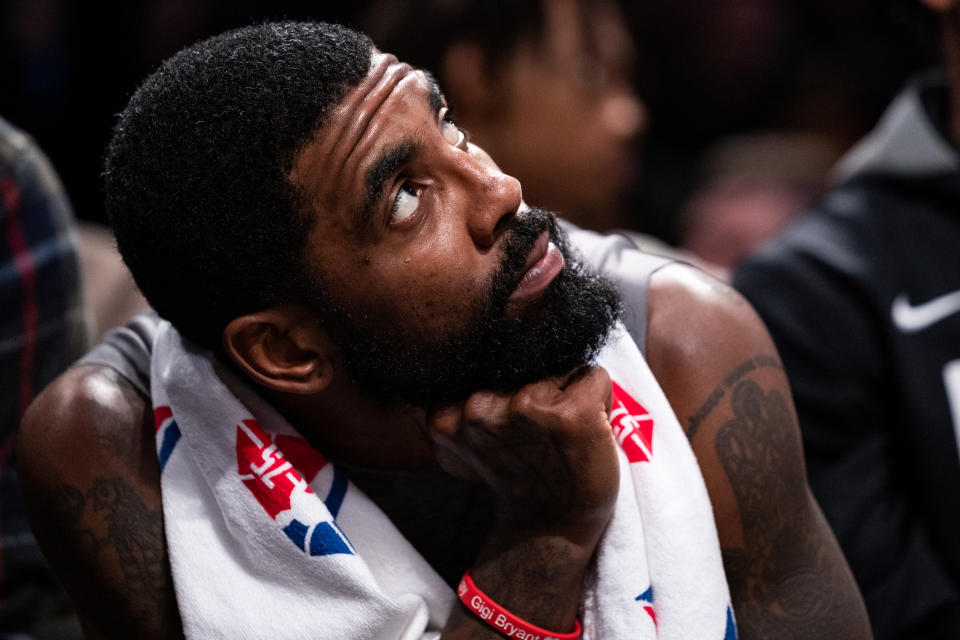As he addressed reporters Thursday, as Kyrie Irving again refused to show any contrition for his own behavior and be accountable for his actions and promoting a movie that contains verifiably false information about Jewish people, he deflected more than once.
Asked if he was surprised that his actions hurt people, Irving replied, “I think I can ask a better question: Where were you when I was a kid, figuring out that 300 million of my ancestors are buried in America? Where were you guys asking those same questions when I was a kid, learning about the traumatic events of my familiar history, and what I’m proud to come from?”
His largely nonsensical, rambling screed continued.
“I’m a human being that is 30 years old and I’ve been growing up in a country that’s told me that I wasn’t worth anything, and I came from a slave class and that I come from a people that are meant to be treated the way we are treated every day,” the Brooklyn Nets star said. “So I’m not here to compare anyone’s atrocities, I’m just here to continue to expose things.”
In point of fact he did compare atrocities, which is problematic enough. He also said, “I’m still sitting in this seat, standing,” so this wasn’t exactly a master class in oratorical skill.
A few hours after the Nets suspended Irving five games on Thursday, he did issue an apology via Instagram.
At this point, it’s unclear whether anyone actually understands Irving, but to hazard a guess, it seems like he wants to be pro-Black but won’t accept that he can do that without being an antisemite.
I want Kyrie to be pro-Black. I want Irving to use multiple platforms and his vast audiences to highlight the myriad, seemingly unending stream of anti-Black racism that remains rampant in this country.
There are examples of it daily, in practice and in policy. Twitter, Instagram, TikTok — they are all filled with them. But our liberation as Black people can’t be gained by supporting the marginalization of others. It just can’t. Nor should it.


This week alone there was a story out of Chicago of an ignorant comedian who in 2022 still thinks it’s funny to use a Black-skinned ventriloquist dummy with ridiculously exaggerated lips named “Sista Girl” who loves watermelon and welfare checks in his act (because nothing says “I’m a fresh comic” like perpetuating tropes that are at least 40 years old). There’s a case before the Supreme Court aiming to end affirmative action policies meant to help even the playing field for Black students. An Alabama judge was ousted after saying the N-word and that George Floyd “got what he deserved.” And on Halloween, some young white people thought nothing of walking around their Walmart in hideous blackface in prisoner costumes.
The list never ends.
Amplify it, Kyrie. All of it. Call it out. Call out the million-dollar fines banks are still paying for refusing mortgages to Black prospective homebuyers. Call out the deliberate neglect in Jackson, Mississippi, that led to an American capital city with an over 70% Black population being under a boil water notice for months and not having any water for weeks. The medical racism. The educational racism. The workplace racism.
Irving can become the NBA’s town crier of anti-Black racism. He can highlight the abuses we still endure and celebrate the hard-earned victories.
He can’t, and shouldn’t, do it at the expense of Jewish people.
In all of the research Irving is so often quick to point out, has he read anything about the history between Black Americans and Jews? The truth is there should be an allyship. Numerous writers and scholars have documented the way Nazis studied American Jim Crow laws that rose as a response to Reconstruction to learn how to best subordinate Jews.
One of the founders of the NAACP was a Romanian-born Jew, Henry Moskowitz. During the Civil Rights movement, it wasn’t just Black churches in the South that were firebombed — synagogues were too, at least seven of them. Rabbi Abraham Joshua Heschel took part in the Selma to Montgomery March alongside Dr. Martin Luther King Jr. Rabbi Joachim Prinz was a co-organizer of the March on Washington and a speaker at the event.
Jews were Freedom Riders, in large numbers. They sat at lunch counters with Black students trying to end segregation.
They are not the enemy.
No one, at least not this writer, is denying how difficult it is to learn about the atrocities endured by enslaved Black people in this country, of the terror inflicted through public lynchings during the Jim Crow years, of the families irreparably changed because of the racism embedded in the war on drugs. As educator and activist Brittany Packnett-Cunningham has said, “Every Black person you meet is a miracle. We are descended of lineages meant to be destroyed.”
It hurts to know the past, it often hurts to experience the present, the structures and system still in place.
You can share all of that — without denying the humanity of others.
